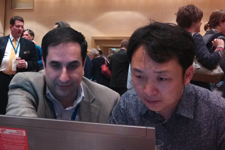
MassDiGI Managing Director Monty Sharma (left) demonstrates "On Call."
A game developed by UMass Medical School, the Massachusetts Digital Games Institute and Becker College was voted Best in Show at the Serious Games and Virtual Environments Showcase at the 2013 SSIH International Meeting for Simulation in Healthcare in Orlando, Fla.
“We are very excited, pleased and proud to have received this recognition,” said Michele P. Pugnaire, MD, senior associate dean for educational affairs and professor of family medicine & community health. The interprofessional Center for Experiential Learning and Simulation at UMMS played a key role in the game’s development.
The training, communication and assessment game, titled “On Call,” simulates an emergency department and is designed to be played by medical and nursing students. The multiplayer, asynchronous game allows students to use social or Facebook-style game mechanics to play different medical team roles in a fast-paced setting. Students have an opportunity to virtually assess, evaluate and treat patients while balancing factors such as time, efficiency and resources.
“By combining gaming technology with medical education, ‘On Call’ represents a special opportunity for innovation in simulation,” said Melinda Taylor, senior engineer in simulation.
“On Call” was built by students from Becker College, Worcester Polytechnic Institute, Rensselaer Polytechnic Institute, Springfield College, Mount Holyoke College and Berklee College of Music, with support from UMMS experts and game industry professionals during MassDiGI’s 2012 Summer Innovation Program at Becker College in Worcester, according to MassDiGI Executive Director Timothy Loew.
Loew said the “On Call” game will enter a closed beta testing period next semester, allowing for further data to be gathered. With data in hand, the partners plan to continue the development and commercialization process.
“Not only was it a fun project to be a part of,” said Barbara Walsh, MD, associate professor of emergency medicine and pediatrics, “it was great to work with game designers, artists and programmers.”
“Building ‘On Call’ was a great experience for me and everyone on our team,” said Cordell Zebrose, a WPI student who worked on the game.
“As we know from our experiences and outcomes at UMMS, simulation technologies are having a positive impact across the health care professions on many levels. And, in the case of serious games like ‘On Call,’ we are eager to explore new opportunities,” said Dr. Pugnaire.